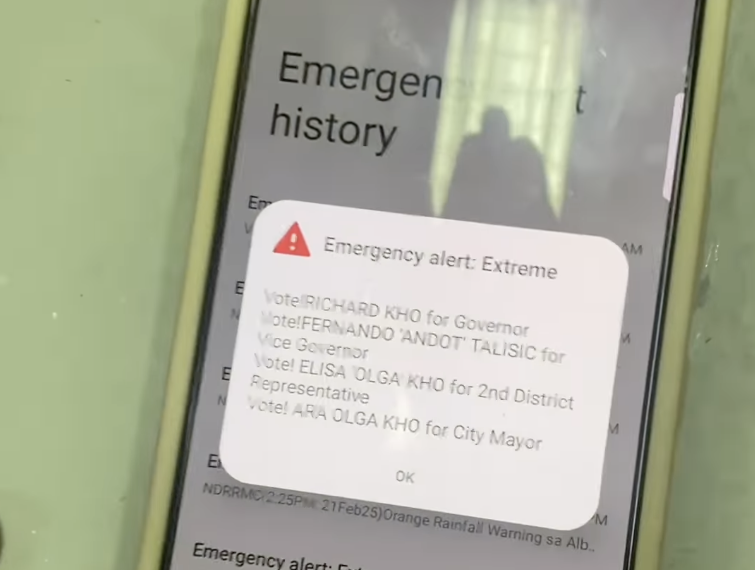OCD, Comelec hit alert system misuse

The National Telecommunications Commission (NTC) was urged on Sunday to investigate and act on reports that unscrupulous candidates were using the country’s emergency alert system for election purposes.
Both the Department of National Defense’s Office of Civil Defense (OCD) and the Commission on Elections (Comelec) made the request amid reports that candidates for the May 12 elections used the country’s Emergency Cell Broadcast System (ECBS) for campaign purposes.
The alert system was created in 2014 by the Free Mobile Disaster Alerts Act, or Republic Act No. 10639, which carries penal provisions and fines.
If found guilty of violating telecommunications laws, a candidate can also be disqualified by the Comelec.
The OCD said in a statement that the alert system, implemented in 2017, was created to assist people in disaster situations, such as earthquakes, typhoons and other public safety threats.
“The misuse of this system for political gain is unacceptable and will not be tolerated,” said the OCD, the implementing arm of the interagency National Disaster Risk Reduction and Management Council.
The OCD said it received “multiple reports” from residents in “certain provinces” who reported receiving emergency alerts that included political messages urging them to vote for specific candidates.
“These messages, designed to mimic urgent emergency notifications, create confusion and may lead to complacency during real crises,” the OCD said.
“The OCD is actively coordinating with relevant agencies to thoroughly investigate these incidents and ensure that those responsible are held accountable to the fullest extent of the law,” it added.
Comelec Chair George Garcia warned those behind the illegal use of ECBS are putting many people in danger in their communities.
“These people are interfering with the government in sending emergency alerts in times of calamities, including floods, earthquakes and tsunamis,” the elections chief said.
“We are afraid that if this becomes prevalent during the campaign season, people may wrongly assume that these alerts were false when a real disaster occurs,” he said in a radio interview.
Authorities urged the public to remain vigilant and report any misuse of the ECBS to the OCD, which can file the appropriate complaint with the NTC.
In the meantime, the two agencies just made appeals to circumspection after a Masbate City resident, identified as Christian Zaragoza, claimed that he and his workmates received on April 3 an extreme emergency, but it urged them to vote for members of the Kho family in different local positions in the elections.
It was unclear whether the “alerts” received by the Masbate residents were actually ECBS alerts or were only made to appear to be.
Neither the OCD nor Comelec claimed to have verified the Masbate resident’s complaint, but the two agencies have representatives in the province and the city to do so.
Based on its initial investigation, the OCD said that communication companies Smart and Globe denied utilizing the ECBS for any “nonemergency and any political campaign alerts.”
The companies also claimed not to have offered any “ECBS services” to private individuals or companies for any purpose other than genuine emergencies.
ECBS can broadcast a message to all phones within a specific area at the same time through cell towers, which is much faster than sending text messages to each individual phone number.
Normally, only telecommunication companies can send messages using ECBS.
However, the Department of Information and Communications warned that “rogue” cell towers could also broadcast emergency alerts.
A device could be set up to trick phones into connecting to these fake cell towers.
Once connected, an unscrupulous individual can send out fake messages, including false emergency alerts, to these phones.





















